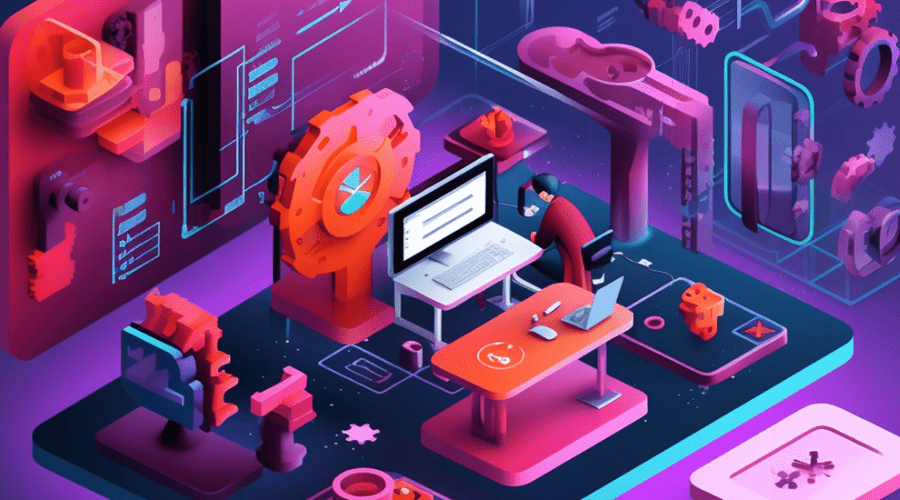
In the ever-evolving landscape of technology, one word dominates the discourse – Software development. It’s the heartbeat of innovation, the driving force behind our digital existence, and the key to unlocking the potential of the future. This blog will take you on a comprehensive journey into the world of software development, exploring its intricacies, trends, and the pivotal role it plays in shaping the digital era.
The Foundation: Understanding Software Development
At its core, software development refers to the process of designing, coding, testing, and maintaining software. It encompasses a wide array of activities that transform an idea into a functioning and efficient piece of technology. The inception of software development can be traced back to the early days of computing, but it has come a long way since then.
Evolution of Software Development Methodologies
The history of software development is marked by the evolution of methodologies, each aiming to streamline the development process and enhance the end product’s quality. From the traditional Waterfall model to the iterative Agile methodology, developers have experimented with various approaches. Today, Agile stands out as the preferred methodology due to its flexibility and ability to adapt to changing project requirements.
Trends Shaping the Future of Software Development
As technology continues to advance, so do the trends in software development. Staying abreast of these trends is crucial for developers, businesses, and anyone interested in the digital landscape. Let’s delve into some of the most influential trends that are shaping the future of software development.
1. Artificial Intelligence (AI) Integration
Artificial Intelligence is no longer a futuristic concept; it’s a present reality transforming the software development landscape. Developers are incorporating AI to enhance user experiences, automate mundane tasks, and make software more intelligent. Machine learning algorithms are being utilized to analyze vast amounts of data, enabling applications to learn and improve over time.
From recommendation systems in e-commerce applications to chatbots providing real-time customer support, AI is becoming an integral part of software development. Embracing AI allows developers to create more efficient, personalized, and adaptive software solutions.
2. DevOps: Bridging the Gap between Development and Operations
DevOps, a portmanteau of Development and Operations, is a set of practices that aim to automate and streamline the collaboration between software development and IT operations. This approach breaks down traditional silos, fostering a culture of collaboration, communication, and continuous integration.
DevOps accelerates the development process, reduces errors, and ensures a faster time-to-market for software products. Automation tools, continuous integration, and continuous delivery (CI/CD) pipelines are pivotal components of the DevOps philosophy, empowering development teams to deliver high-quality software with greater efficiency.
3. Cloud Computing Revolution
The advent of cloud computing has revolutionized how software is developed, deployed, and maintained. Cloud platforms like AWS, Azure, and Google Cloud provide scalable infrastructure, enabling developers to focus on writing code without worrying about the underlying hardware.
Cloud-native development is gaining prominence, with applications designed specifically for cloud environments. Microservices architecture, containerization using tools like Docker, and serverless computing are reshaping the software development landscape. These approaches offer scalability, flexibility, and cost-effectiveness, making cloud computing an indispensable part of modern software development.
Challenges in Software Development
While the software development field is brimming with opportunities and innovation, it is not without its challenges. Addressing these challenges is essential for ensuring the success of any development project.
1. Security Concerns
With the increasing frequency and sophistication of cyberattacks, security has become a paramount concern in software development. Developers must prioritize implementing robust security measures to protect sensitive data and prevent unauthorized access. Regular security audits, code reviews, and the adoption of secure coding practices are crucial steps in mitigating security risks.
2. Rapid Technological Changes
The fast-paced nature of technological advancements poses a challenge for developers to stay updated with the latest tools, languages, and frameworks. Continuous learning and adaptability are vital skills in the software development field. Developers must proactively seek knowledge about emerging technologies to remain competitive in the ever-evolving industry.
3. Collaboration and Communication
As software development projects become more complex, collaboration and communication become challenging, especially in distributed or remote teams. Employing effective collaboration tools, establishing clear communication channels, and fostering a culture of transparency are essential for overcoming these challenges.
4. Balancing Speed and Quality
The demand for rapid development and quick releases often conflicts with the need for high-quality, bug-free software. Striking the right balance between speed and quality is a constant challenge for development teams. Adopting agile methodologies, automated testing, and continuous integration practices can help achieve this delicate equilibrium.
The Future Landscape of Software Development
As we look ahead, the future of software development promises exciting possibilities and challenges. The integration of emerging technologies, the evolution of development methodologies, and the dynamic nature of the industry create an environment ripe for innovation.
Whether you are a seasoned developer, a tech enthusiast, or a business owner looking to leverage technology, understanding the intricacies of software development is crucial. It is the driving force behind digital transformation, shaping the way we live, work, and interact with the world.
In conclusion, the journey through the realm of software development is a fascinating exploration of creativity, problem-solving, and continuous learning. From its humble beginnings to its current state of prominence, software development continues to be the backbone of the digital revolution. As we embrace the trends, tackle challenges, and envision the future, one thing remains clear – the impact of software development will shape the trajectory of technology for years to come.










